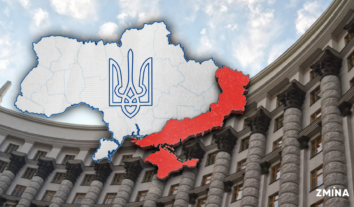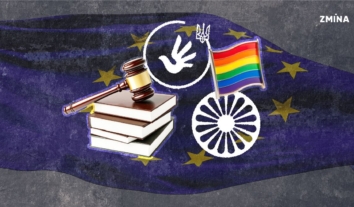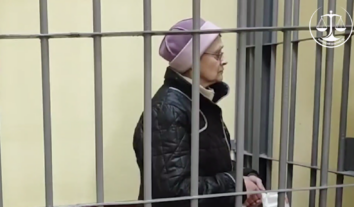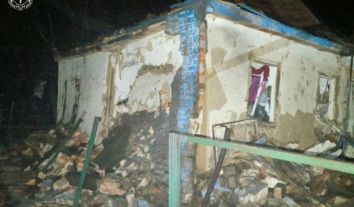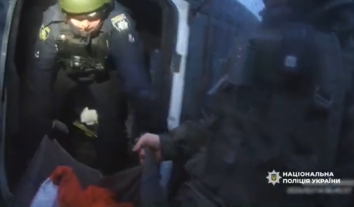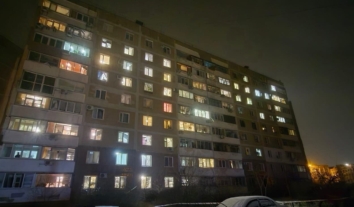In search of “Raskolnikov”
The famous character of “Crime and Punishment , the novel by Fedor Dostoyevsky, can be found in the headline of this article not accidentally – both in the fictional story by the classical Russian writer and in the quite real story that occurred in one of the cities of Ukraine, the whole thing started (but was not limited to) with the murder of the elderly woman. But whereas Rodion Raskolnikov was indeed guilty of the offence, the characters of this story were brought into investigating proceedings exclusively on the account of their drug dependence.
The rainy morning on March 16 started unusually for the patients of Kirovograd Narcology [drug addiction treatment] Dispensary: when they came to the clinic to take the medicines they need, they got into the middle of the unpleasant story.
Alyona (hereinafter all the names shall be substituted with fictional ones) and her husband were among them. They have to come to the clinic every day to take methadone – the opioid substitution therapy medicine essential for the individuals who made up their minds to quit injecting drugs. Just as always, they were eager to take the medicine as early as possible to reach their working places in time. By the moment they arrived, several dozens of police officers (the witnesses estimate their number from 20 to 30) had already circled the Dispensary and had been about to interrogate all OST patients. As law enforcement officers explained, the criminal offence had occurred in the roundabouts, therefore all drug dependent people had to give their evidence.
According to eye-witnesses’ reports, first the criminal investigation department officers had intended to “load” all the individuals to vehicles and bring them “to the city police station”, but one of the patients said that in this case he would call a lawyer. The police officers deliberated on the matter and decided to conduct an interrogation right on the spot – near the clinic – three CID officers stayed there to do this. The law enforcement officers lined up all the patients in a queue and started to interrogate them one by one near their car.
“They were giving no explanations. They do not treat OST patients to be human beings. They just came up and said: hello, here we have the first ones, take your seats and let’s go. I said: what, how, why? you will learn about everything there [they retorted]. Only afterwards, when I started to ask questions, one of them told me that one elderly woman was murdered, and she had lived in that area” – Oksana, OST patient, told.
According to the reports by the individuals who gave evidence, the whole interrogation process took just several minutes. Within 90 minutes the CID officers managed to draw up several dozens of police reports (according to the police data, there were twenty, the witnesses report about forty or even fifty). The eye-witnesses complain that no police officers gave their names and ranks; in answer to all attempts to object or inquire they responded with rudeness. The OST patients who have given their consent to talk with us, were unanimous: compared to the perspective of being detained, the interrogation on the spot looked like a good deal for them; and they were reluctant to dispute anything.
“That was the deal” – Oksana explains.
The interrogation itself looked weird to the clinic patients both in terms of its format and contents.
“They mostly asked us which medicines we take; how many years we have been enrolled in the program; at what time we come to the site (the healthcare facility where individuals take their OST medicines is called the site – authors’ comments); at what time they dispense the medication to us; and about our whereabouts during the previous day. They told us: one granny was murdered here, therefore if you don’t want all of you being “rounded up”…they forced us to being photographed; nobody is willing, but they forced us” – Alyona tells us.
She and her husband were being interrogated simultaneously – he was at the back seat in the police car, and she was outside the car. Nobody among the patients whom we communicated with was able to tell the particular questions the CID officers had asked about the murder of the elderly lady. However, everyone remembers very well how they had provided other information the police had been interested in: names and surnames of their family members, their e-mail addresses and phone numbers, working places’ contact information and other types of personal data. However, this information was not included into the police reports.
“One of the police officers said: “Now I have got half of the program [OST program] very well represented personally”. Not just last names, but personally. How should we understand this? We can consider it to be a joke, but also as a threat” – Oleg, an OST patient, recollects.
The police officers left around 9:30 and they were not interested in the patients who came to the Dispensary later. More than that: the eye-witnesses report that in the course of the interrogation the police officers had had already an identikit of the suspect: the law enforcement officers were searching of a red-haired man, and they asked the saleswoman at the local kiosk about him. Why was there a need then to interrogate several dozens of the individuals who were on drug addiction treatment?
Natalia Isaeva, the head at the Legalife-Ukraine NGO, is a member of the local team fighting against the cases of police abuse of human rights. The patients who had been interrogated approached her with requests for help, and she made up her mind to inquire on her own about the motives of the law enforcement. In response to her information request, Kirovograd police answered with just three sentences resulting in the conclusion that “no reasons have been identified to bring the police officers to disciplinary liability”. The prosecutors assigned the in-service check and later responded that Kirovograd police officers interrogated the Narcology Dispensary patients as witnesses “within the limits of their authorities”. Nobody among the interrogated persons has filed any complaints; therefore, “no response measures have been undertaken”. The statement about no complaints submitted by OST program patients regarding the actions of the CID officers is an absolute truth. They were so scared that the police officers would try to discredit them that they hardly agreed to tell us about that story with a condition of total anonymousness.
“They learned such pieces of information about us that we were very unwilling this information to be disclosed somewhere else. I’ve got a family, my kid, my wife, I don’t want to get into trouble with them. My mother is quite elderly. I don’t want my co-workers to find out, because it was my mother who had got this job for me, she works there herself. I just don’t want to let her down”, – Oleg says.
We decided to send our own information requests to the law enforcement bodies, and their responses were much more spatial in this case. The police explain the matter like this: On March 15 the data on pre-meditated murder was entered into the Single Registry of Pre-Trial Investigations. “Seeking to undertake all relevant investigation (search) measures and to implement the order on conducting investigation (search) activities… the Criminal Police (Criminal Investigation) officers had to work with the individuals who take treatment courses at the communal facility called “Kirovograd Oblast Narcology Dispensary” – the law enforcement body’s answer says. There have been no explanations by the police why it is the patients at this clinic were picked and why participation in the OST program constitutes a sufficient ground to conduct an interrogation. They made pledges, however, that the CID officers had stuck with the law: they had informed the interrogated persons about their rights and liabilities (particularly, about the right not to self-incriminate and against the closest relatives); they held the interrogation for each person individually and separately from all others.
But those who gave evidence testify to the opposite: nobody of them was aware of their status as being interrogated; no information about the right not to incriminate oneself was provided to them as well.
“I was not a witness for that crime, therefore they could not interrogate me as a witness” – Oleg is convinced.
The police response also underscored the fact that they had not entered the premises of the healthcare facility. We could not corroborate personally the fact as the doctors at the Narcology Dispensary left our questions with no answers. However, Natalia Isaeva confirms the fact:
“They were outside in the street. They did not enter the healthcare facility. The healthcare professionals heard. I talked with healthcare professionals afterwards. The said: yes, the guys [patients] came in and told about the interrogations by police officers, but they [healthcare professionals] did not react as the police officers had not entered the clinic”.
The law enforcement claim that all the personal data of the Narcology Dispensary patients were collected exclusively in the format of police reports. But it is still not clear why they should need medical information and photographs of these persons. Judging from the responses of the government bodies, the in-service check was held (if any) just formally, and it is not clear where are the results of this check.
The Prosecutor’s Office decided to treat our inquiry to be just a “citizens’ request, therefore at the moment when this story is published we have never received any clarifications.
Currently the OST program patients are in the mood of concerned waiting: will the summoned up for a repeated interrogation? will there be attempts to pin the murder to them? will they be pressured by means of the personal information about them? “If something occurs somewhere, whom do they target? They used to hook us immediately. They check us out” – the patients explain.
This is not the only case. The first case of the mass detention of the drug dependent people right near the clinic occurred four years ago in Ternopil and was extensively publicized among human rights activists, – Sergey Shvets, the Chief at the Special Investigations Department, the Ombudsman’s Office in Ukraine.
Then they detained around 20 people at the site, the law enforcement officers loaded them into buses and brought to district police stations. They were kept there for 6-8 hours; interrogated within the frames of some criminal cases and fingerprinted in contradiction with the law. We visited that location and after our own inquiry we proved that these detentions had been unlawful. Using our evidence, the Prosecutor’s Office even launched a criminal investigation [regarding the police action], but then they closed it. However, the corpus delicti [in police’s deeds] was obvious in the case. The Prosecutor’s Office stated that the drug dependent people allegedly had had no complaints [regarding police actions]. Some cases of disciplinary liability regarding some police officers were in place. In our opinion, the case was closed unlawfully” – the Ombudsman’s Office official reports. According to Shvets, the case in Kirovograd, being not that blatant, still points to the systemic problem the drug dependent people face: discrimination and stigmatization.
“If we discuss the case in Kirovograd, there we may see: the violations of the procedure how an interrogation must be held, the violations while executing the assignments given by investigation officer, and even some features of unlawful (arbitrary) detention. But the key problem is the vulnerability of this population group [drug dependent people – the authors]. If a murder occurs in the vicinity of the Ombudsman Office Secretariat or near the Cabinet of Ministers’ premises, are the police officers going to come there to interrogate everybody?” – he explains.
Yury Belousov, the Chair of the Board at the “Expert Center on Human Rights” is well aware about the cases when drug dependent people are persecuted. He assumes that the problem can be solved if the vulnerable populations (in this cases, they are drug dependent people) are trained how to protect themselves from the arbitrary deeds of the police. Natalia Isaeva underwent just this type of training, and now in Kirovograd she is sorting out this very case. There are 6 teams overall, in addition to Kirovograd, they operate in Odessa, Kherson, Dnipropetrovsk, Sumy and Lviv.
“Whereas an average citizen has some slim chances to protect himself/herself, vulnerable populations do not have even these opportunities. That is the reason why we implement the initiative focused on raising the standards of self-defense by the vulnerable populations in interaction with the law enforcement, training the populations in efficient skills to protect themselves and restore their rights when abuse already occurred” – Belousov says.
The International “Renaissance” Foundation provided support for training sessions for regional activists. Yelena Kucheruk, the Public Health program manager at the Foundation, says that it is for 12 years already that “Renaissance” has been supporting the projects aimed at protecting vulnerable populations’ rights, including the right to healthcare.
“Once it was our Foundation that launched many services for vulnerable populations “from scratch”: people living with HIV, OST patients, drug dependent people, sex workers. These services were designed to reduce incidence of the diseases as well as crime rate: to help the individuals to re-socialize. However, pretty soon it became clear that even with the services available the problem is not solved completely if there is a vulnerability related to the law, stigma and discrimination. People are afraid to resort to help, because they know they may become an easy target for the law enforcement. Many of these individuals have criminal record or some problems with the law, and these problems reduce their access to medical and social aid. Following this line of thought, we understood that if legal problems are addressed, this will provide them with an opportunity to make use of medical and social services as well as to return to normal way of life, to become a full-fledged member of the society, to find a job, to create a family, etc” – Ms. Kucheruk explains the reasons why the Foundation supports these initiatives.
Currently the Renaissance develops both areas: protection of the vulnerable populations’ rights by means of engaging human rights activists and lawyers, using the capacity of the Ombudsman’s Office and the National Preventive Mechanism, civil society investigations; and by means of building the capacity of the communities – training them how to protect their rights. According to the Foundation, it is this approach that proves to be the most efficient at present.
Human rights activists insist on the point: if we want to prevent these situations from happening any more, the bias must be overcome: that being a drug dependent person means being an offender. This bias inflicts harm both to them and to us: justice can’t exist in line with similar biases.



